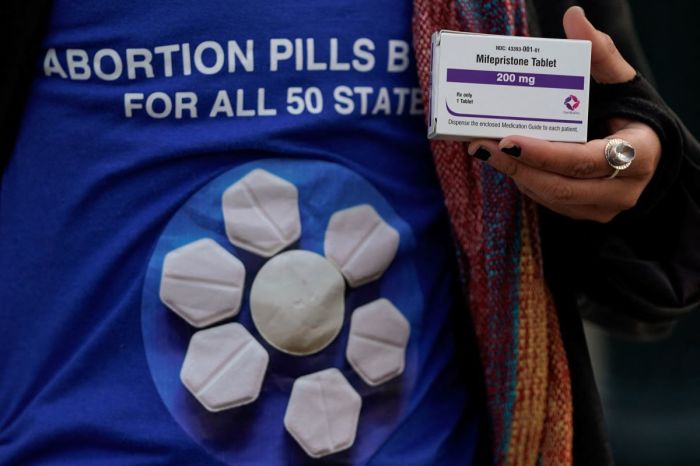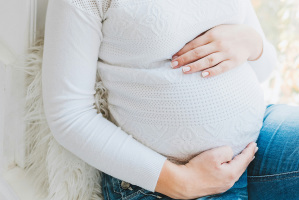Trump says he won't restrict the abortion pill but leaves open the possibility: 'Things change'

President-elect Donald Trump is doubling down on his prior insistence that he will not take action to restrict access to the abortion pill mifepristone while suggesting that he has not closed the door on changing his mind in the future.
Trump discussed a wide variety of topics in an interview with NBC's Kristen Welker that aired on "Meet the Press" Sunday. When asked if he would "restrict the ability of abortion pills" after taking office in January, Trump responded, "I'll probably stay with exactly what I've been saying for the last two years, and the answer is no."
When Welker followed up by inquiring as to whether he would "commit to that," Trump replied: "Do things change? I think they change."
The president-elect mentioned how President Joe Biden repeatedly promised not to pardon his son Hunter only to reverse course and issue a pardon for his son last week.
"I don't like putting myself in a position like that, so things do change. But I don't think it's going to change at all," Trump said on the abortion pill.
Mifepristone, also known as medication abortion, is the first drug in the chemical abortion regimen. It destroys the environment in the uterus and starves an unborn baby to death. The abortion pill is reportedly used in about half of all pregnancy terminations in the United States.
Mifepristone has received renewed attention in recent years following the U.S. Supreme Court's 2022 Dobbs v. Jackson Women's Health Organizationdecision, which determined that the U.S. Constitution does not contain a right to abortion. Following the Dobbs ruling, pro-life activists have set their sights on the abortion pill.
The U.S. Supreme Court rejected a challenge to the U.S. Food and Drug Administration's approval of the abortion pill earlier this year on procedural grounds. In an interview with CBS News over the summer, Trump insisted that he would not enforce the Comstock Act, which can be interpreted to prohibit the distribution of the abortion pill by mail. Trump also vowed that the abortion pill would still be "widely available" if he won the 2024 presidential election.
Pro-life activists have long maintained that chemical abortion pills present a danger to the health and safety of women.
In a statement shared with The Christian Post, Susan B. Anthony Pro-Life America President Marjorie Dannenfelser asserted that "Unregulated, mail-order abortion drugs are a serious and growing threat to women's health and safety, as well as the lives of countless unborn children, all across this country – made possible by the reckless actions of the Biden-Harris administration."
"They are the radical abortion lobby's backstop to undo all the pro-life progress made at the state level since Dobbs. Even the pro-abortion media can't hide that these drugs are killing women and fueling dangerous new forms of domestic violence," she added.
Dannenfelser listed the names of several women harmed by abortion drugs, including Catherine Herring, whose husband poisoned her with an abortion pill in an unsuccessful attempt to murder their unborn child. She also pointed to the high-profile cases of Amber Thurman and Candi Miller, who died after experiencing complications from chemical abortion.
Thurman developed an infection because some of her baby's remains were still in her uterus five days after taking the abortion pill, while Miller experienced "excruciating pain" because her body failed to expel her baby's remains.
"Because the profit-driven abortion industry will sell high-risk drugs to anyone with a zip code over the web, 'completely free of face-to-face interaction with a clinician,' it is absurdly easy for traffickers and abusers to get their hands on them," Dannenfelser said. "No one who cares about the health and well-being of women can ignore this issue."
In 2020, the pro-life advocacy group Live Action released an investigative report that elaborated on the dangers posed by abortion drugs. The report identified "severe cramping, contractions, and heavy bleeding" as common side effects of abortion pills.
"According to the FDA, women can expect the bleeding to last 9 to 16 days on average, which 8% experience bleeding for more than 30 days," the report stated.
Statistics compiled by the FDA and included in the report found that the abortion pill caused 24 maternal deaths between 2000, the year it was first approved by the FDA, and 2018. Medication abortion has also led to more than 1,000 hospitalizations as well as 4,000 "adverse effects" in the nearly 20 years.
Ryan Foley is a reporter for The Christian Post. He can be reached at: ryan.foley@christianpost.com





























